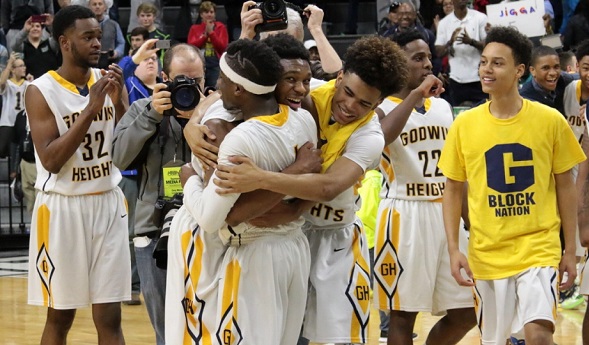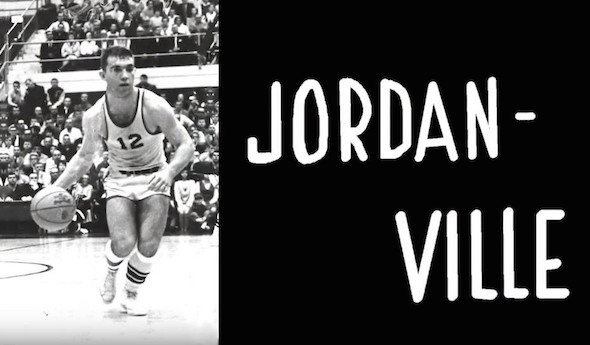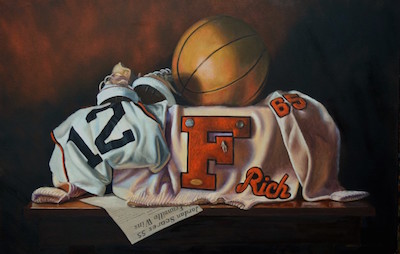
Godwin Heights Caps Long Trip to Top
March 28, 2015
By Geoff Kimmerly
Second Half editor
EAST LANSING – The final seconds of Friday night at the Breslin Center were about relief for Wyoming Godwin Heights senior Delaney Blaylock, after he led the Wolverines to their first MHSAA championship game berth.
Relief turned into disbelief Saturday – and satisfaction for a community that started this trip nearly 90 years ago.
Godwin Heights defeated Detroit Henry Ford 85-68 in the final game of this season to earn its first MHSAA title, 86 years after its first trip to the final week.
Grand Rapids Godwin made its first MHSAA Quarterfinal in 1929 and finished runner-up in 1950 and then as Wyoming Godwin in 1960. The Wolverines played in four more Semifinals – including in 2013 – and then fell in the Quarterfinals again in 2014.
“I was just thinking I can’t believe we’re here,” Blaylock said Saturday night. “I just didn’t want to be comfortable being in the state championship, but (wanted) to win the state championship.”
Like Powers North Central did in winning Class D earlier Saturday, Godwin Heights (26-1) capped a three-year run that will go down among the most successful in MHSAA history.
The Wolverines were a combined 74-5 over the last three seasons, which tied them for the ninth-most wins over a period of that length.
And the last of those wins was more or less decided by halftime.
Henry Ford scored the first basket of the game and never led again, as Godwin Heights build a lead as large as 23 points during the second quarter while shooting 55 percent from the field and making 8 of 11 3-point shots during the first 16 minutes.
 The Wolverines led 50-29 at the break and never by fewer than 14 points during the final two quarters.
The Wolverines led 50-29 at the break and never by fewer than 14 points during the final two quarters.
“I don’t think I ever saw a team shoot like that in the Breslin,” Henry Ford coach Kenneth Flowers said. “The craziest part about it, they didn’t shoot the ball well yesterday (33 percent from the floor, 26 from 3-point range). They came out today on fire. … They played like state champions.”
The Godwin Heights basketball community had to struggle through sadness at the end of summer. Junior-to-be Ta’Carhri Richardson – who played for first-year Wolverines coach Tyler Whittemore on the junior varsity in 2013-14 – was shot and died Aug. 3.
Whittemore, a 2005 graduate, was promoted to the varsity job after coaching in the program at various levels for eight seasons.
“Toughness is what defines them,” Whittemore said of his players. “It’s tough to go through what they did, have that tragedy happen (during) the summer before the basketball season was going to start. We had one of our games on his birthday, the second game against Holland (on Dec. 16). The guys rallied around each other. They were playing hard for one another, getting loose balls for one another … not for themselves.”
Blaylock led five scorers in double figures Saturday, with 19 points, and he also grabbed 10 rebounds. Freshman guard Lamar Norman came off the bench for 17 points, while senior forward Michael Williams and junior guard Leon Redd both scored 13 and junior forward Richard Major had 12. Williams also grabbed nine rebounds and had four assists.
Detroit Henry Ford, playing in its first Final after also playing in and winning its first Semifinal on Friday, finished 21-6.
Senior forward Joshua Davis had 16 points and 11 rebounds and junior point guard James Towns had 15 points and six assists. They were the leading scorers this season as the Trojans bounced back from two straight sub-.500 seasons to also make their first Quarterfinal since 1984.
“I was telling them I know it hurts, and they’re crying their eyes out right now too,” Flowers said. “But they took Henry Ford High School to a place it’s never been before. These guys are the foundation of good things to come.”
Click for the full box score and video from the postgame press conference.
PHOTOS: (Top) Godwin Heights players celebrate the first MHSAA title in program history. (Middle) Henry Ford guard Antaun Carter is surrounded by Wolverines defenders in the lane.

Film Fills In Picture of 'Fennville Flash'
By
Ron Pesch
MHSAA historian
December 28, 2017
We’ve been here before, but not in this way.
The last time was for a retrospective, covering one of the most impressive and awe-inspiring prep careers in Michigan high school history. That time was in print, and included a handful of still images that tried to illustrate the unbelievable.
But this time, the story is in documentary form. It’s woven together from grainy, scratched, faded silent film, a format of capturing memories familiar to thousands of people from generations past, as well as a series of modern-day high-resolution interviews.
Here, the basketball life of the athlete known as the “Fennville Flash” delivers on many levels. Yes, there is a Richie Jordan.
JordanVille, a documentary by John Mooy & Anne Colton, recalls a time when legend spread via word of mouth, newsprint and AM radio.
While it’s hard to comprehend for many today, the exploits of our athletic heroes were formed by “poets in the press box” who sat with pencil and paper, a typewriter, a microphone or a telephone, and described to their audience what they witnessed. On the receiving end, readers and listeners conjured up visualizations based on the facts, phrases and superlatives designed to create an image.
“Traveling left to right on your radio dial” helped listeners feel they were a member of the crowd, seated in the stands, in on the action and a witness to the mayhem. “Packed to the rafters,” reminded fans the importance of what was happening. An exciting game, presented by those with skill, created an event you longed to see. If a broadcast couldn’t be picked up on a transistor or tube radio, the final result might not be known, at the earliest, until the following day’s newspaper arrived.
I’ve told Jordan’s story via the MHSAA before; how he latched on to athletic training, weights and repetition to mold himself into a well-rounded athlete, able to leap to heights unexpected for a kid with a 5-foot-7 frame. The tales of his unfathomable accomplishments slowly leaked beyond the city limits of Fennville into Kalamazoo and greater Southwestern Michigan, then to Detroit. When Detroit Free Press writer Hal Schram relayed Jordan’s feats, the secret traveled across the state and beyond its drawn borders.
From there the legend of Jordan’s accomplishments grew. In Fennville, as in many small towns across the country, the city shut down when a game was played. The Jordan story was so enticing that thousands would travel vast distances to see him play with their own eyes. Today, his single season scoring average of 44.4 points per game during the 1964-65 campaign still remains the top mark in the MHSAA record book.
 JordanVille runs just shy of a half hour. Contained within is insight into the athlete that is challenging to relay in print form. Thanks to access to home movies and a series of interviews with Jordan, former teammates, past opponents and his high school coach, the determination, dedication and drive of a kid who wouldn’t let physical size be a deterrent from achievement radiates from the screen. On display is small town America at its finest, and perspective formed over 50+ years.
JordanVille runs just shy of a half hour. Contained within is insight into the athlete that is challenging to relay in print form. Thanks to access to home movies and a series of interviews with Jordan, former teammates, past opponents and his high school coach, the determination, dedication and drive of a kid who wouldn’t let physical size be a deterrent from achievement radiates from the screen. On display is small town America at its finest, and perspective formed over 50+ years.
For Mooy, it completes a filmmaking journey started six years ago. But the story of Jordan, in his eyes, date back to his school days. Mooy first heard about Jordan as a 7th-grader from a math teacher. A second-team all-St. Joseph Valley League selection, Mooy played at Marcellus High School and scrimmaged against Jordan and the Fennville Blackhawks.
He couldn’t believe his eyes.
“Everyone wanted to see this kid play,” said Mooy in 2011. “He was the first high school player I saw sign an autograph.
Today, with the interviews complete, and the film ready for viewing, Mooy sees more than just a sports story:
“With the benefit of years now passed, I look at the Rich Jordan story with a new respect. JordanVille created a place that was welcoming no matter who you were, or what color your skin happened to be. It was the 1960s. Rich was growing up Jewish, the Civil Rights Movement was in full swing, and the Vietnam War was on everyone's mind. And in Fennville, Michigan, from 1961 to 1965, the Jordan high school years, there were lessons beyond sports being learned by everyone that would last a lifetime. The Jordan household, under the guidance of (his parents) Tuffy and Sylvia Jordan, is where the story begins."
The film speaks of a time that has departed. Competition for our attention was less focused; phones hung on walls or sat on tabletops, communities were tighter, the training table featured peanut butter and chocolate milk instead of protein powder. A city could easily be renamed for a day.
The film also reminds us that those days were far from perfect.
If all goes as planned, the public will see the finished product come the flip of the calendar. In West Michigan, JordanVille is scheduled to show on New Year’s Day at 6 p.m. on WGVU, and will repeat on WGVU-Life at 7:30 p.m., Friday, Jan. 5.
Seek it out, and spread the word, just like in days of old.
 Ron Pesch has taken an active role in researching the history of MHSAA events since 1985 and began writing for MHSAA Finals programs in 1986, adding additional features and "flashbacks" in 1992. He inherited the title of MHSAA historian from the late Dick Kishpaugh following the 1993-94 school year, and resides in Muskegon. Contact him at [email protected] with ideas for historical articles.
Ron Pesch has taken an active role in researching the history of MHSAA events since 1985 and began writing for MHSAA Finals programs in 1986, adding additional features and "flashbacks" in 1992. He inherited the title of MHSAA historian from the late Dick Kishpaugh following the 1993-94 school year, and resides in Muskegon. Contact him at [email protected] with ideas for historical articles.
PHOTOS: (Top) Richie Jordan runs Fennville's offense during his thrilling high school career in the 1960s. (Middle) Jordan memorabilia, as captured by Bill Williams.

